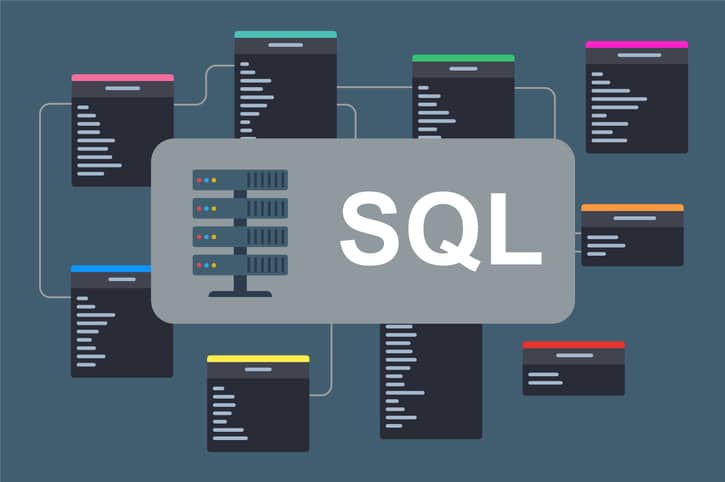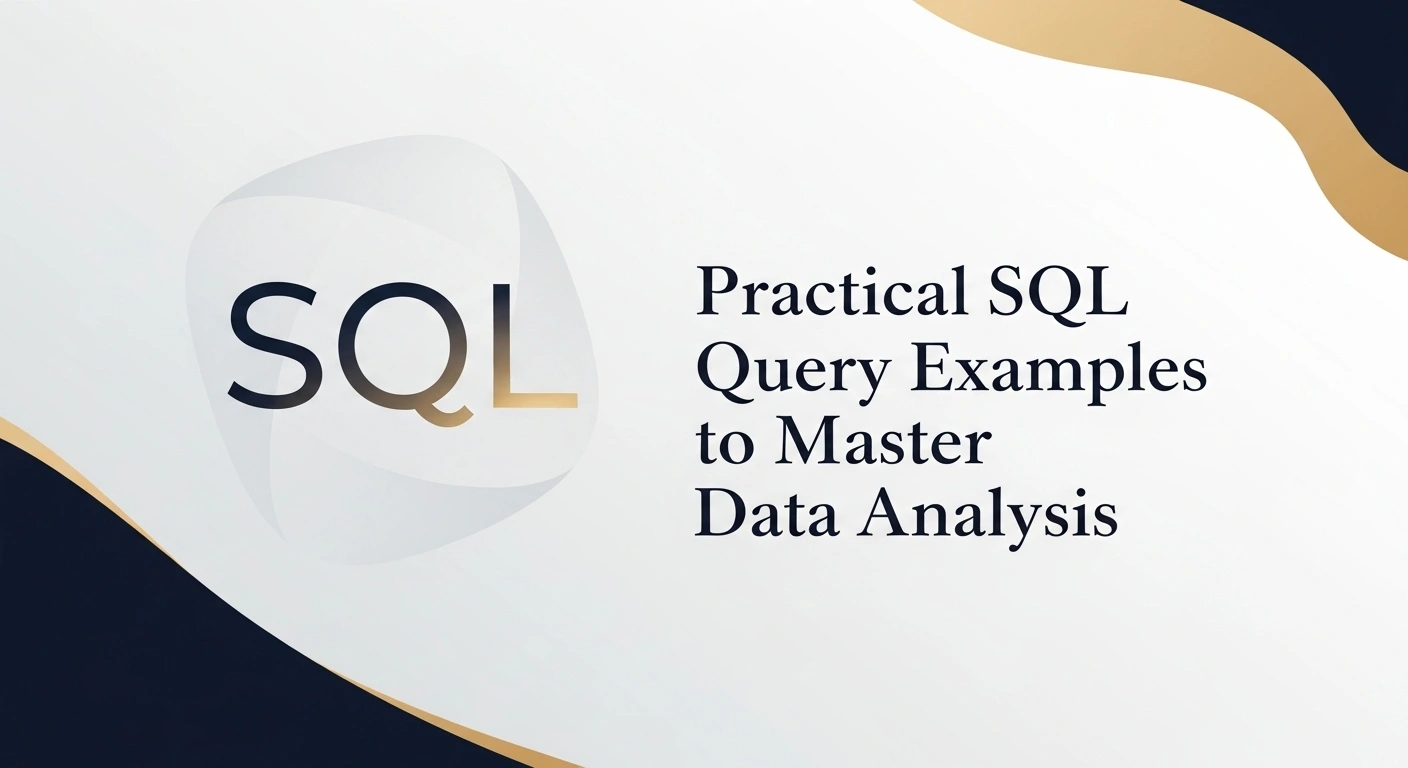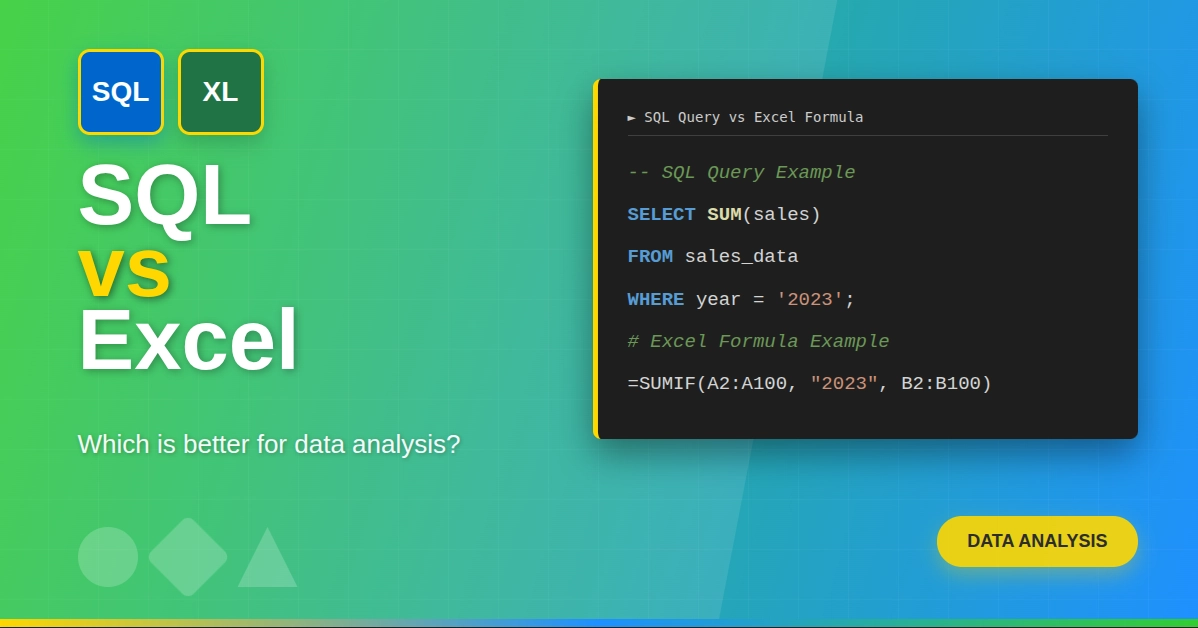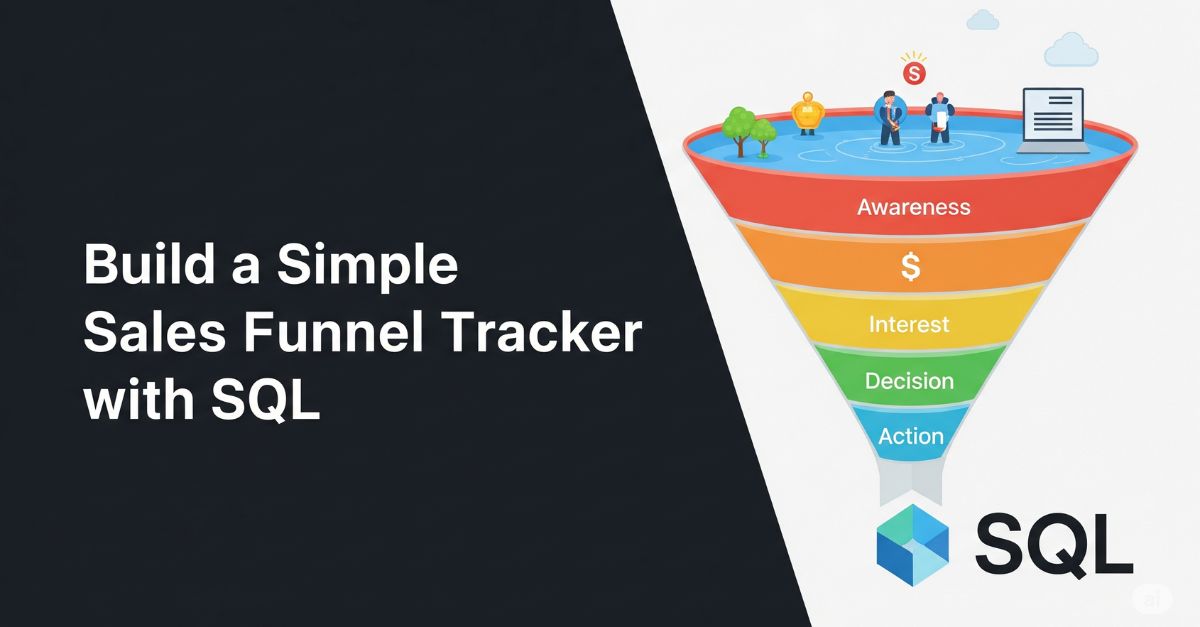SQL (Structured Query Language) is what you use to work with relational databases. If you've ever wondered how companies keep track of millions of customer orders, analyze their sales trends, or manage user accounts, SQL is doing the heavy lifting behind the scenes.
Learning SQL through actual projects is way more effective than just memorizing commands. You will run into real challenges, like figuring out why your query is running slowly or how to structure data so it actually makes sense. These are the kinds of problems you will solve in actual jobs, whether you're analyzing data for a startup, managing databases for a large company, or building the backend of an application.
Here are 15 SQL projects that range from beginner-friendly to more advanced. They're organized by difficulty level, so you can start wherever you're comfortable and work your way up. Each project focuses on different skills. Some teach you database design, others help you get better at writing efficient queries or analyzing complex datasets.
Master SQL and Database management with this SQL course: Practical training with guided projects, AI support, and expert instructors.
SQL Projects for Beginners
1. Retail Sales Data Analysis
Project Details: Work with a retail sales dataset to analyze purchasing patterns, customer behavior, and product performance. This project teaches you the fundamentals of data exploration and business intelligence queries that every analyst needs to know.
Features:
- Calculate daily, monthly, and yearly sales totals
- Identify best-selling products and categories
- Analyze sales trends over time
- Find peak shopping hours and days
- Calculate customer purchase frequency
Key Concepts:
- Aggregate functions (
SUM,COUNT,AVG,MAX,MIN) GROUP BYandHAVINGclauses- Date and time functions
ORDER BYandLIMITfor rankings- Basic filtering with
WHEREconditions
Tools Needed:
- MySQL or PostgreSQL
- Sample retail dataset (publicly available on Kaggle)
- Any SQL client (DBeaver, DataGrip, or MySQL Workbench)
Sample Analysis:
-- Find top 5 products by revenue
SELECT product_name, SUM(quantity * price) as revenue
FROM sales
GROUP BY product_name
ORDER BY revenue DESC
LIMIT 5;
2. Customer Segmentation for Marketing
Project Details: Segment customers based on their purchasing behavior using RFM (Recency, Frequency, Monetary) analysis. This is a standard technique used by marketing teams worldwide to identify valuable customers and target campaigns effectively.
Features:
- Calculate recency (days since last purchase)
- Measure purchase frequency per customer
- Compute total monetary value per customer
- Create customer segments (VIP, regular, at-risk, lost)
- Generate targeted customer lists for campaigns
Key Concepts:
- Date calculations and
DATEDIFFfunctions - Customer-level aggregations
CASEstatements for segmentation logic- Subqueries and CTEs (Common Table Expressions)
- Window functions for ranking
Tools Needed:
- PostgreSQL or MySQL
- Customer transaction dataset
Learning Outcomes: Master the art of behavioral segmentation that drives real marketing decisions in companies.
Sample Source Code
3. COVID Data Analysis Dashboard Queries
Project Details: Analyze real-world COVID data to track cases, deaths, vaccination rates, and trends across countries and time periods. This project uses actual datasets that data analysts work with and teaches you time-series analysis.
Features:
- Track daily new cases and deaths by country
- Calculate moving averages for trend smoothing
- Compute vaccination coverage percentages
- Compare pandemic progression across regions
- Identify peak infection periods
Key Concepts:
- Working with real-world messy data
- Time-series analysis techniques
- Percentage calculations and ratios
- Self-joins for comparing time periods
- Window functions for moving averages
Tools Needed:
- PostgreSQL (recommended for window functions)
- Our World in Data COVID-19 dataset
- Tableau or Power BI for visualization (optional)
4. Movie Database Clone (IMDb-style)
Project Details: Build a complete movie database system tracking films, actors, directors, ratings, and box office performance. This teaches you how to handle many-to-many relationships and complex queries across multiple tables.
Features:
- Store movies with release dates, genres, and budgets
- Track cast and crew with their roles
- Manage user ratings and reviews
- Calculate average ratings and review counts
- Find movies by actor or director
- Analyze box office performance
Key Concepts:
- Many-to-many relationships via junction tables
- Multiple
JOINoperations in single queries - Database normalization principles
- Aggregate functions with grouping
- Full-text search on titles and descriptions
Tools Needed:
- MySQL or PostgreSQL
- IMDb datasets (publicly available)
Industry Relevance: Entertainment companies use similar structures for content management systems.
Sample Source
5. University Course Enrollment System
Project Details: Design a complete academic database handling students, courses, instructors, enrollments, and prerequisites. This mirrors actual student information systems used by universities globally.
Features:
- Manage student enrollment in courses
- Track course prerequisites and enforce them
- Calculate student GPAs and course averages
- Monitor class capacity and waitlists
- Generate academic transcripts
- Track instructor teaching loads
Key Concepts:
- Self-referencing foreign keys (prerequisites)
- Complex join conditions
- Calculated fields for GPA
- Constraint enforcement
- Views for transcript generation
- Handling business rules in database
Tools Needed:
- PostgreSQL or MySQL
- Understanding of academic systems
Intermediate SQL Projects
6. Inventory Management and Warehouse System
Project Details: Create a production-grade inventory system tracking products, warehouses, stock movements, and reorder alerts. This is critical for logistics and supply chain operations in any product-based business.
Features:
- Multi-warehouse inventory tracking
- Real-time stock level monitoring
- Automatic reorder point alerts
- Track incoming and outgoing shipments
- Calculate inventory turnover rates
- Handle product variants (size, color)
- Generate stock valuation reports
Key Concepts:
- Triggers for automatic inventory updates
- Stored procedures for complex operations
- Transaction management for stock movements
- Audit trails with timestamp tracking
- Handling concurrent updates
- Performance optimization with indexes
Tools Needed:
- MySQL or PostgreSQL
- Understanding of supply chain basics
Real-World Application: Every e-commerce company, manufacturer, and retailer uses systems like this.
Sample Source
7. Sales Performance Dashboard Backend
Project Details: Build the SQL backend for a sales analytics dashboard showing KPIs, trends, and performance metrics. This is what sales managers and executives use daily to track business health.
Features:
- Calculate key metrics (conversion rates, average deal size)
- Track sales rep performance and quotas
- Analyze sales pipeline by stage
- Compute month-over-month growth rates
- Identify top customers and products
- Forecast future sales based on historical data
- Generate commission calculations
Key Concepts:
- Advanced aggregations and grouping
- Window functions (
LAG,LEADfor comparisons) - Pivot tables using
CASEstatements - Year-over-year and period comparisons
- Percentage calculations
- Materialized views for performance
Tools Needed:
- PostgreSQL (best for analytics)
- Sales CRM dataset
- Connection to BI tools like Tableau
Business Impact: These queries power executive dashboards in companies of all sizes.
Sample Source
8. Banking Transaction Database
Project Details: Design a secure banking database handling accounts, transactions, transfers, and fraud detection. Learn how financial institutions manage billions of transactions with accuracy and security.
Features:
- Manage customer accounts and balances
- Process deposits, withdrawals, and transfers
- Maintain complete transaction history
- Ensure transaction atomicity (no partial transfers)
- Implement fraud detection rules
- Generate account statements
- Track overdrafts and fees
- Handle multi-currency accounts
Key Concepts:
- ACID properties and transactions
- Database locking mechanisms
- Triggers for balance updates
- Check constraints for data integrity
- Audit logging for compliance
- Handling decimal precision for money
- Stored procedures for complex operations
Tools Needed:
- PostgreSQL or MySQL
- Strong understanding of financial transactions
Compliance Note: Banking databases require strict accuracy and audit trails for regulatory compliance.
Sample Source
9. E-commerce Product Recommendation Engine
Project Details: Build SQL queries that power product recommendations based on purchase history, browsing behavior, and collaborative filtering. This is how Amazon and other platforms suggest products.
Features:
- Track user browsing and purchase history
- Find frequently bought together items
- Identify similar products based on categories
- Calculate product affinity scores
- Generate personalized recommendations
- Analyze cross-sell opportunities
- Track recommendation effectiveness
Key Concepts:
- Self-joins for finding patterns
- Collaborative filtering with SQL
- Association rule mining basics
- Complex aggregations
- Window functions for ranking
- Performance optimization for large datasets
Tools Needed:
- PostgreSQL
- E-commerce transaction data
- Understanding of recommendation algorithms
Industry Standard: Product recommendations drive 35% of Amazon's revenue, making this skill highly valuable.
Sample Source
10. Healthcare Patient Records System
Project Details: Create a HIPAA-compliant database for managing patient records, appointments, prescriptions, and medical history. Healthcare IT is a massive field requiring skilled database professionals.
Features:
- Store patient demographics and insurance info
- Track medical history and allergies
- Schedule appointments with conflict prevention
- Manage prescriptions and medication tracking
- Record lab results and vital signs
- Generate billing and insurance claims
- Create doctor visit summaries
Key Concepts:
- Temporal databases (tracking changes over time)
- Complex date/time scheduling logic
- Data privacy and access control
- Hierarchical data (medical history)
- Many-to-many relationships
- Audit trails for compliance
- Stored procedures for clinical workflows
Tools Needed:
- PostgreSQL or SQL Server
- Understanding of healthcare workflows
Career Opportunity: Healthcare IT is growing rapidly with high demand for database skills.
Sample Source
Advanced SQL Projects
11. Data Warehouse with ETL Pipeline
Project Details: Build a complete data warehouse implementing star schema design with fact and dimension tables. Learn how enterprises consolidate data from multiple sources for business intelligence.
Features:
- Design fact tables for business metrics
- Create dimension tables (time, product, customer)
- Implement slowly changing dimensions (SCD)
- Write ETL scripts to load data from sources
- Create aggregate tables for performance
- Build OLAP cubes using SQL
- Generate complex analytical reports
Key Concepts:
- Star and snowflake schema design
- Dimensional modeling techniques
- Incremental data loading strategies
- Handling historical data changes
- Partitioning large tables
- Materialized views
- Query optimization for analytics
Tools Needed:
- PostgreSQL or SQL Server
- Understanding of data warehousing concepts
- Python for ETL scripting (optional)
Enterprise Value: Every large company has data warehouses for decision-making.
Sample Source
12. Website Traffic Analytics Database
Project Details: Build a web analytics system similar to Google Analytics tracking page views, user sessions, conversions, and traffic sources. This is essential for any digital business.
Features:
- Track page views and session duration
- Analyze traffic sources (organic, paid, social)
- Calculate bounce rates and exit pages
- Monitor conversion funnels
- Identify user paths through website
- Track A/B test results
- Generate cohort analysis reports
Key Concepts:
- Session tracking and reconstruction
- Funnel analysis with sequential queries
- Attribution modeling
- Cohort analysis using window functions
- Time-series aggregations
- Click-stream analysis
- Performance optimization for high volume
Tools Needed:
- PostgreSQL with TimescaleDB extension
- Web log data or analytics dataset
- Understanding of web analytics metrics
Real-World Usage: Digital marketing teams rely on these queries daily for campaign optimization.
Sample Source
13. Subscription Business Analytics
Project Details: Analyze subscription metrics for a SaaS business including MRR, churn rate, customer lifetime value, and cohort retention. These metrics drive decision-making in subscription-based companies.
Features:
- Calculate Monthly Recurring Revenue (MRR)
- Track customer churn and retention rates
- Compute Customer Lifetime Value (CLV)
- Analyze subscription upgrades and downgrades
- Generate cohort retention tables
- Forecast revenue based on trends
- Identify at-risk customers
Key Concepts:
- Cohort analysis techniques
- Churn prediction queries
- Revenue recognition over time
- Window functions for retention calculation
- Date-based segmentation
- Forward-looking projections
- Complex KPI calculations
Tools Needed:
- PostgreSQL
- Subscription billing dataset
- Knowledge of SaaS metrics
Business Critical: SaaS companies live and die by these metrics, making this expertise highly valuable.
14. Supply Chain Optimization Database
Project Details: Design a comprehensive supply chain database tracking suppliers, procurement, shipments, and delivery performance. Optimize costs and improve efficiency using data-driven insights.
Features:
- Manage supplier catalog and pricing
- Track purchase orders and fulfillment
- Monitor shipment tracking and delays
- Calculate lead times and delivery performance
- Analyze supplier reliability scores
- Optimize inventory based on demand
- Identify supply chain bottlenecks
Key Concepts:
- Complex multi-table relationships
- Date calculations for performance metrics
- Aggregate analysis across supply chain
- Stored procedures for reorder logic
- Triggers for status updates
- Reporting on operational KPIs
Tools Needed:
- PostgreSQL or Oracle
- Supply chain dataset
- Logistics domain knowledge
Industry Demand: Supply chain analytics is crucial post-pandemic with massive hiring in this space.
15. Financial Portfolio Tracker and Analyzer
Project Details: Build a comprehensive investment portfolio management system tracking stocks, bonds, mutual funds, and crypto. Calculate returns, analyze performance, and generate tax reports.
Features:
- Track multiple asset types and transactions
- Calculate portfolio value and returns
- Analyze asset allocation and diversification
- Generate profit/loss statements
- Track dividends and interest income
- Compute tax implications (capital gains)
- Compare portfolio performance to benchmarks
Key Concepts:
- Time-weighted return calculations
- Complex financial formulas in SQL
- Handling historical price data
- Multi-currency support
- Transaction cost tracking
- Performance attribution analysis
- Regulatory reporting requirements
Tools Needed:
- PostgreSQL
- Financial market data APIs
- Understanding of investment concepts
Financial Sector: Portfolio management systems are used by investment firms, advisors, and fintech companies globally.
Getting Started with SQL Projects
Choosing Your First Project: Start with beginner projects to master fundamentals before moving to complex systems. Focus on one domain you're interested in—whether that's e-commerce, healthcare, or finance.
Best Practices:
- Always normalize your database design
- Use meaningful table and column names
- Add indexes on frequently queried columns
- Write comments explaining complex queries
- Test with realistic data volumes
- Document your schema with ER diagrams
Building Your Portfolio: Complete 3-4 projects across different domains. Document your approach, showcase complex queries, and explain business value. Host your SQL scripts on GitHub with clear README files.
Next Steps: After completing these projects, explore advanced topics like query optimization, database administration, distributed databases, and real-time data processing with tools like Apache Kafka and Spark SQL.






